Fresh Produce
Follows 2013 holidays, when Aldo, Lidl and Dunnes Stores were selling some produce items for as little as 5 cent a kilo
Ireland’s new Competition and Consumer Protection Commission has warned the nation’s Department of Agriculture against asking supermarkets not to engage in Christmas vegetable price wars.
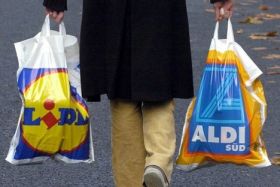
The minister for agriculture, food and the marine, Simon Coveney, was questioned on the issue in the Dáil recently, and said Tom Hayes, the junior minister in his department, had been told by supermarkets they would not run promotional campaigns this Christmas.
Last year, the Irish Times reports, Aldi, Lidl and Dunnes Stores were selling some produce items, including onions, carrots, sprouts and potatoes, for as little as 5 cent a kilo.
The retailers claimed they were covering the cost of the promotion, but the Irish Farmers’ Association (IFA) said farmers were being forced to take the hit and staged multiple protests over Christmas week.
The National Consumer Agency merged with the Competition Authority this year to form the Competition and Consumer Protection Commission.
According to the Irish Times, in a letter to the Department of Agriculture, Dr John Evans, head of competition enforcement, said he was aware of a response by Coveney to a parliamentary question from Fianna Fáil’s Eamon O’Cúiv.
Coveney said Hayes “had been assured by the individual supermarkets that they would not run a promotional campaign for fruit and vegetables in the lead to Christmas 2014.”
The commission has also written to a number of supermarkets on the issue and, while the Department of Agriculture does not fall under its remit, Dr Evans said “any agreement or concerted practice whereby undertakings such as retailers coordinate their prices is one of the most serious forms of competition law infringements, which the commission has a statutory duty to investigate”.
Fairtrade Foundation says 100,000 emails have been sent to supermarkets asking them to stock Fairtrade bananas
Shoppers have sent more than 100,000 emails to Asda and Tesco stores asking them to switch their banana offering to Fairtrade, the Fairtrade Foundation has said.
And Fairtrade supporters dressed as bananas, and holding a five-meter inflatable banana decorated with the message ‘Go Fairtrade’, have campaigned outside stores in cities across the UK, and outside Asda’s Leeds HQ.
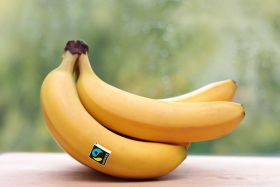
The organisation launched a new campaign last month to persuade the two top four retailers to choose certified banana lines. It claims that less than 10%% of the bananas sold by Asda and Tesco are currently Fairtrade certified.
It said that more than eight in ten Asda and Tesco shoppers would pay more for their bananas if the workers who produced them would benefit.
But both supermarkets have claimed that their banana procurement and supply chains have higher or equivalent standards than the Fairtrade certification. Asda said that its banana lines are fairly traded, while Tesco said it pays its banana workers on average 6% more than the Fairtrade minimum price.
Head of campaigns at the Fairtrade Foundation, Jonathan Smith, said that since the start of the campaign Tesco has made some new public commitments about its banana sourcing, including a pledge to pay living wages to workers on banana plantations by 2017.
“However, we are still waiting for commitment to independent verification. This is what the UK public are calling for, and what we believe is vital in order to protect the interests of both farmers and workers in the developing world, and shoppers here in the UK,” he said.
“Shoppers across the UK are sending a clear message to Asda and Tesco – they want an independent assurance that banana farmers and workers are not paying the price for their cheap fruit,” said Smith.
Smith added that the campaign has heard “nothing of substance” from Asda.
The Fairtrade Foundation said the typical retail price for bananas is 68p per kilo, compared with £1.08 in 2002, which adjusted for inflation is equivalent to £1.40 today.
The South African apple industry has taken a huge stride with the signing of the Apple Export Protocol enabling exports to China
After years of negotiation and dealing with technical issues, the South African Apple and Pear Producers’ Association (SAAPPA) has announced that the Apple Export Protocol to enable apple exports to China has been approved and signed.
The protocol was signed by the Minister of Agriculture, Forestries and Fisheries, Senzeni Zokwana and the Minister AQSIQ, Zhi Shuping, during a state visit to the People’s Republic of China in Beijing on 4 December.
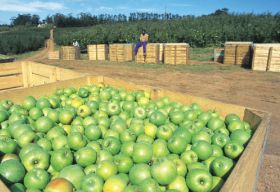
According to a statement issued by Hortgro on behalf of the SAAPPA, the deal culminates an eight-year process between the two countries and will enable the South African industry to expand its ever-broadening marketing footprint.
Tapping into the Chinese market has been a major priority for the industry for more than a decade and should act as a springboard to more effectively access other markets in Asia
Apples are currently exported to 8 primary destinations including Africa, the Far East and Asia, the UK, the Middle East, Continental Europe (including Russia) and smaller volumes to the Indian Ocean Islands, the US and Canada. By adding China to the destination list, Hortgro noted that the fruit industry will continue to create more job opportunities in primary and secondary agriculture. Further market access will also support further growth and economic development which in turn will enhance land reform transformation and new plantings in the industry.
A similar process to also open this market for South African pears has already started after which various other fruits, including stonefruit, will follow. It is trusted that the process to formalise further protocols will be fast tracked given that the fruit exporting industry could prove compliant with international best practice in terms of food safety and phyto-sanitary requirements.
In his reaction to the signing of the protocol, Nicholas Dicey, chairman of SAAPPA, expressed his sincere appreciation and thanks to the Ministry and Department of Agriculture, Forestry and Fisheries (DAFF), particularly the Plant Health and Plant Inspection divisions of the Department and South African Embassy personnel in Beijing, for their endeavours to finalise the protocol with their counterparts in China.
He also thanked industry technical specialists for their critical role in supporting the government officials with technical and scientific data over an extended period of time.
“This was a real team effort and augers well for future cooperation between industry and government”, he noted.
Anton Rabe, executive director of Hortgro, confirmed that the industry had been proactive in preparing for the possible export of apples from the 2015 season.
After the very successful verification visit of Chinese quarantine (AQSIQ) officials earlier in 2014, the industry has prepared the required orchard and export registration lists which could be provided to AQSIQ as soon as it is requested. Once the Chinese quarantine officials have approved and signed off on this list, exports could commence immediately.
Passionate and enthusiastic fresh produce pioneer will be “sadly missed” by those left to run his self-built vegetable empire
William Hunter, the founder of Huntapac Produce in Lancashire, has died.
Known to many in the vegetable industry, Hunter was described by those who knew him an extremely passionate vegetable and salad, grower and packer, who will foremost be remembered as a pioneer in the root vegetable industry.

Hunter developed and built washing and processing machinery at the site in Tarleton, expanding Huntapac Produce from its humble beginnings into the multi-million-pound business it is today.
A spokesperson for Huntapac, said: “His enthusiasm never dwindled, and his ability to encourage and motivate people and involve them in the business was extraordinary. In his later years his stamina was more than equal to any young person, and his ‘can do’ attitude earned him a reputation that he could make the seemingly impossible possible.
“William knew all about sustainability many years before it became a buzzword, and although he was the busiest man in the industry, he always managed to find the time to help those in need.
“His contribution to local charities and the support he gave to the local community was immense, and contributed to the extremely high esteem in which he was held by all those who knew him.”
Another of Hunter’s passions included the restoration of lorries, many of which were used to haul produce to the factory, and for the deliveries to wholesale markets.
Today the William Hunter museum houses more than 20 vehicles, all immaculately restored to their original condition.
Huntapac Produce, meanwhile, is now run by Hunter’s two sons, Warren and Jason, along with his grandsons Will and Henry, who are now the fourth generation within the business.
The spokesperson added: “Although Hunter will be sadly missed by all, his legacy continues, and the foundations for the future of Huntapac Produce are firmly set from one man’s vision, enthusiasm, and continued commitment to excellence and perfection in everything he did.”
Lincolnshire and Kent-based firm posted a pre-tax profit of just over £2m, up from just over £1.5m in the previous 12 months.
Worldwide Fruit has increased both its profit and turnover.
Figures released to Companies House for the most recent financial year reveal that the Lincolnshire and Kent-based company posted a pre-tax profit of just over £2 million, up from just over £1.5m in the previous 12 months.
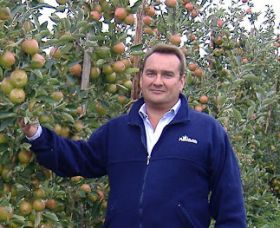
Worldwide Fruit’s turnover for the year to 28 June 2014 was £116.1m, up from £113.2m in the preceding financial year, and a significant increase on the £104.4m turnover recorded by the firm for the year ending 30 June 2012.
Paul Mansfield, a director at Worldwide Fruit, which sources, packs and distributes fruit, said: “The major annual movements have been a reduction in avocado sales; more than offset by gains made in the apple and pear business.
“The avocado margin has reduced year on year due to high raw material prices not being matched by an increase in price to our customers.”
During the financial year the data covers, Worldwide Fruit invested £631,000 in a new warehouse extension to the Spalding production unit – a development that was unveiled last month.
This extension is seen as crucial to Worldwide Fruit going forward, as it reduces the need for external third-party storage, thereby “providing a greater degree of control over fruit quality and reducing fruit handling.”
Mansfield added: “The Jazz variety is continuing to grow in volumes sold and variety recognition by consumers. Further volume growth is expected.”
Founded in the year 2000, and sourcing from more than 1,000 growers across the world, including the UK, Worldwide Fruit employs nearly 260 people.
It has recently won awards for championing British produce and supply chain excellence from Waitrose and Marks & Spencer respectively.
50% of Worldwide Fruit is owned by Fruition PO, with the other half of the company owned by Enzafruit New Zealand (UK).
Darijo Srna, of Shakhtar Donetsk, has bought 20 tonnes of tangerines for children in Ukraine suffering amid scenes of war
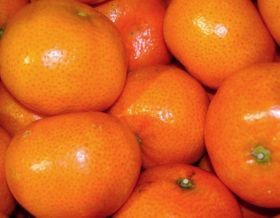
Shakhtar Donetsk’s Croatian international footballer and club captain Darijo Srna has bought 20 tonnes of tangerines for children in Ukraine, the Croatian daily Vecernji List has reported.
Srna was born in Metkovic, a region of southern Croatia well known for its tangerines. Croatia left communist Yugoslavia in 1991 and then fought a four-year war of independence.
“I grew up in Croatia so I also went through a period when I needed help. Donetsk has helped me a lot and this is just a small gift with which I want to pay them back,’ the daily newspaper quoted the 32-year-old as saying.
The Ukrainian top-flight side said on its website: “The lorries carrying the fruit bought in Darijo’s hometown Metkovi have already arrived in Donetsk.”
The tangerines will be distributed to at least 20,000 local children with a special greeting card for every child, the club statement said.
One in seven of Birdseye survey respondents say they don’t eat veg because they can’t find exciting ways to cook it
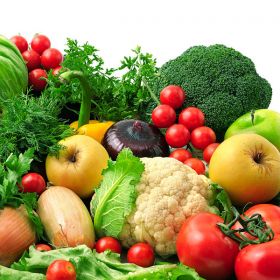
More than 50% adults eat no more than two portions of fruit and vegetables a day, and a quarter of those surveyed in the same new study said preparing healthy food was simply too boring and time-consuming.
7% of those surveyed, meanwhile, said they ate less healthily now than they had as a child.
Men are the worst offenders, according to the research, which was conducted by frozen food manufacturer Birdseye, eating on average just 2.4 portions of veg a day, compared to the 2.7 portions eaten by women.
One in seven of the survey’s 1,000 respondents said they don’t eat vegetables because they can’t find exciting ways to cook them, while a quarter do not know how to cook vegetables at all, researchers discovered.
Almost half of the Londoners questioned (47%) blamed their long commute to and from work for not having the time to cook a proper meal in the evening. And more than half admitted that they only eat two or fewer vegetable portions each day.
Furthermore, the survey found that 25% of those questioned said that they avoid buying vegetables because they expire quickly, while one in ten said they don’t like eating vegetables because of childhood traumas and bad memories of school dinners.
Commission places upper limit on proportion of €125m emergency funding that can be claimed by apple and pear sector
As much as €82m in emergency funding will be made available to the EU apple and pear sectors this season as the European Commission looks to limit the impact of Russia’s wide-reaching ban on fresh produce.
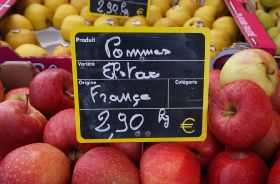
The funding, announced by European Commissioner for Agriculture and Rural Development Dacian Cioloș on 18 August, is part of a support package worth a total of €125m that was formally adopted in Brussels today and is due to be published in the Commission’s Official Journal on Saturday 30 September.
Introduced as an emergency measure to address an anticipated oversupply of fresh fruit and veg on the EU market following Russia’s embargo, the package provides for withdrawals (for example free distribution or composting) and so-called green-harvesting (thinning) or even non-harvesting during the period 18 August to 30 November.
The package covers tomatoes, carrots, cabbage, sweet peppers, cauliflower, broccoli, cucumbers, gherkins, mushrooms, plums, soft fruit, table grapes, kiwifruit, apples and pears.
In order to ensure that the funds are not all taken up by one or two sectors, the Commission confirmed the €82m limit for apples and pears together, with a limit of €43m for the other sectors combined.
UK meat leaders have expressed disappointment over the reporting of a US-based study which claimed that beef production was 10 times more damaging to the environment than other livestock.
The study, published in the Proceedings of the National Academy of Sciences (PNAS), claimed that by applying a uniform methodology to data from the US Departments of Agriculture, the Interior and Energy, it showed that beef was far ahead of other proteins when it came to environmental impact.
A summary of the study said: “The authors found that impacts of dairy, poultry, pork, and eggs were mutually comparable within a factor of two. Beef, however, required 28 times more land, 11 times more irrigation water, five times more greenhouse gas emissions, and six times more reactive nitrogen fertiliser than the respective average burdens of the other four livestock categories.

”Plant-based production, however, including potato, wheat and rice, on average needed “two to six times fewer resources per calorie consumed than non-beef livestock”, it added.
The news has been widely reported across mainstream media, but UK meat bosses have hit back at the coverage, which they said failed to recognise that US production differed considerably from UK grass-fed production.
Nick Allen, sector director for red meat levy body Eblex, said: “Our rain-fed pasture system means we have one of the most efficient and sustainable livestock production systems in the world. In the UK, cattle and sheep primarily convert grass, which cannot be used to feed people, into nutritious food for our growing population. We have very little reliance on irrigation; in fact it takes just 67 litres of water to produce 1kg of beef.
“There are also additional environmental benefits of grazing ruminants, not least in terms of landscape management and maintaining biodiversity, yet livestock production still comes in for undue criticism.
”One of the authors of the report Professor Gidon Eshel, speaking to The Guardian newspaper, acknowledged that US grain-fed production systems exacerbated the issues surrounding feed inefficiency, but he said that even grass-fed cattle had greater environmental footprints than other animal products.
He said the aim of the study was to change the consumer mind-set: “While my work in recent years has clearly demonstrated that plant-based diets exact lower environmental costs than animal-based ones, in the new paper we recognise that this and related work by others have changed little in US diets; people still eat animal-based products with an ever-increasing gusto.
“Our study has a number of implications. First, it can help environmentally minded individuals make environmentally better dietary choices. Perhaps more importantly, the paper can also help inform US agricultural policy.”